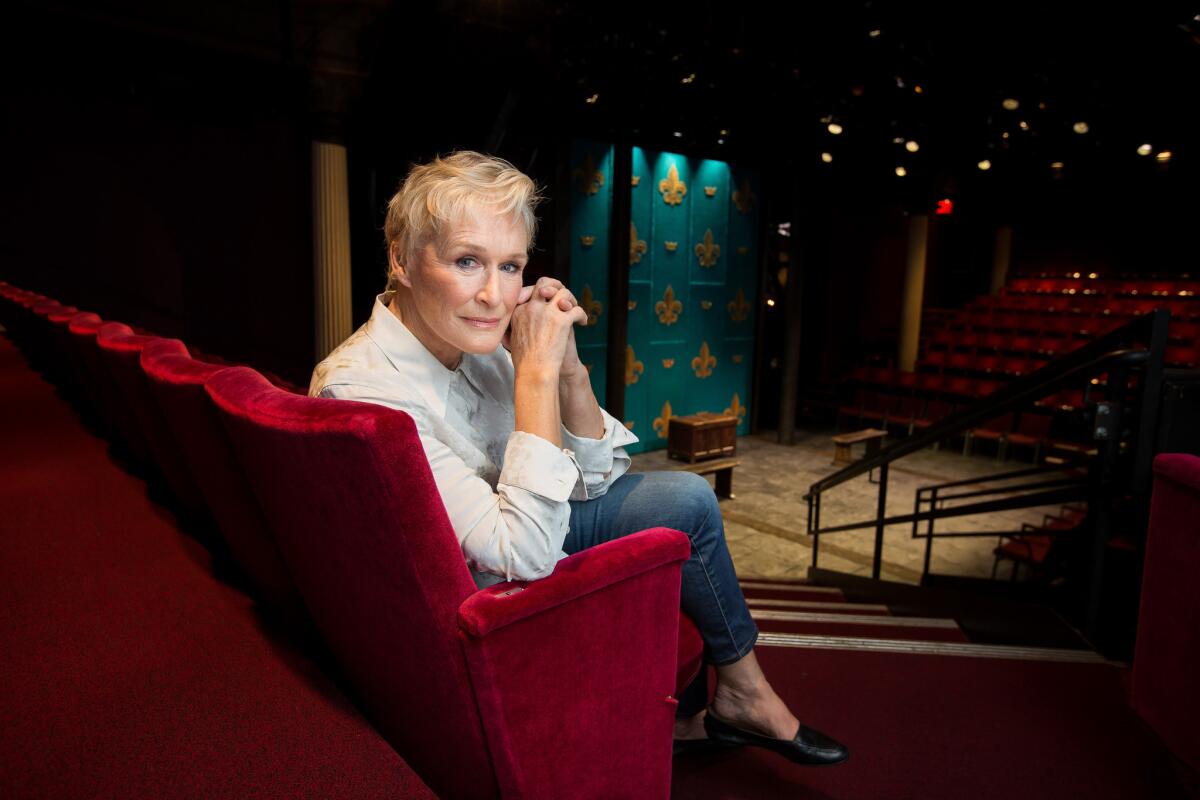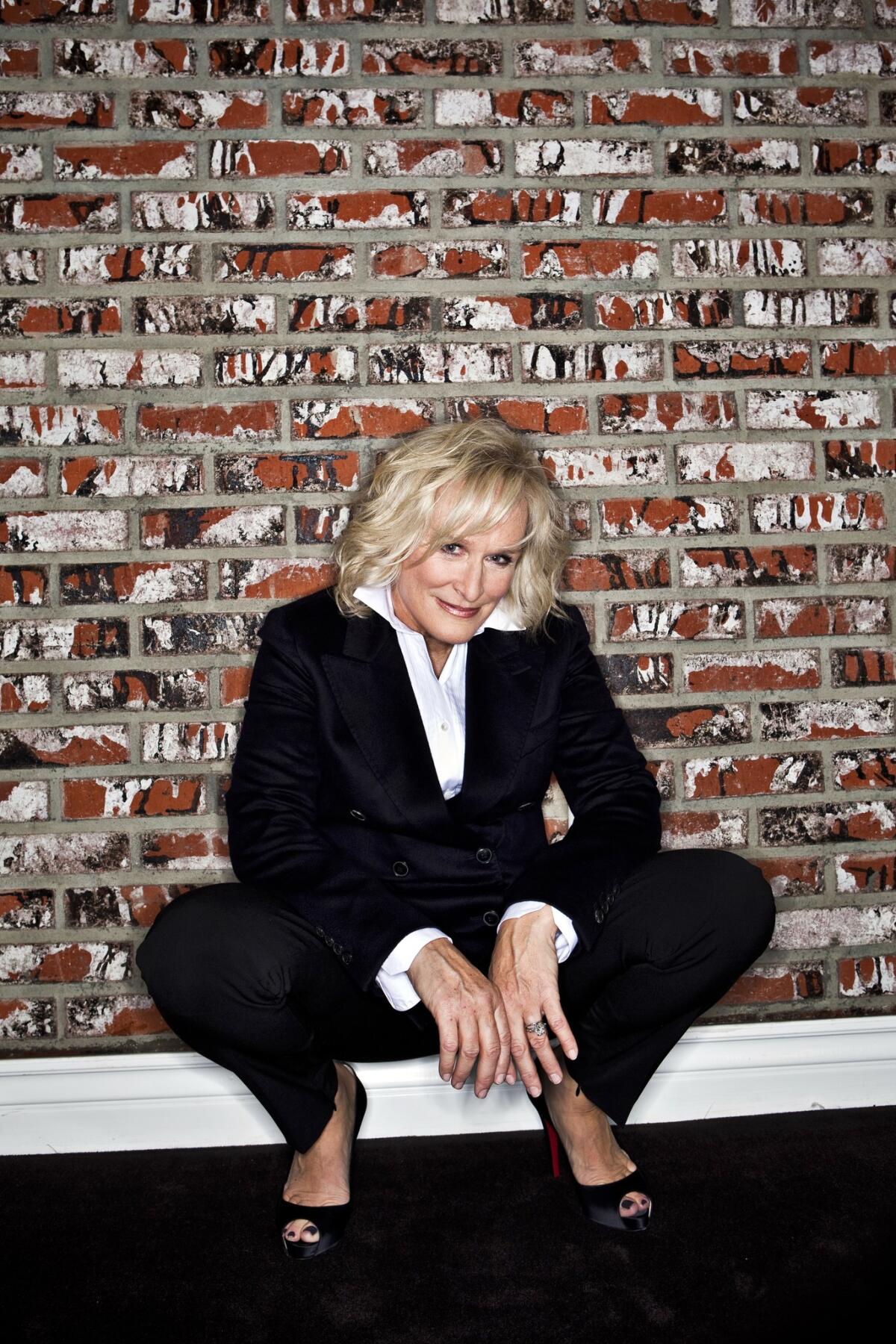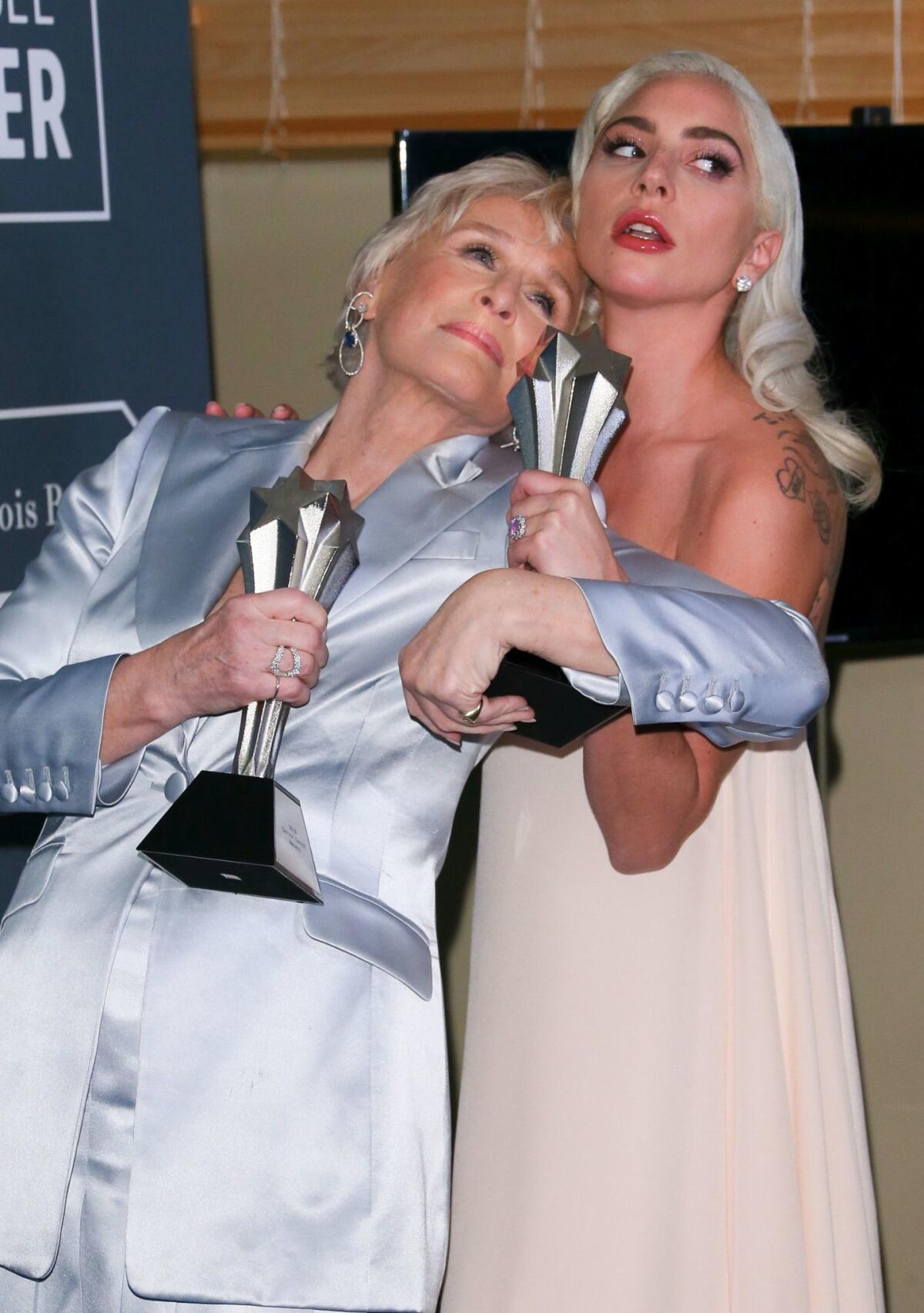Oscar favorite Glenn Close talks acting, Lady Gaga and her first zombie movie

To find Glenn Close in the place she is staying as she makes her way through awards season, you have to spend some time on Sunset Boulevard, which is pretty hilarious considering her Tony-winning role as Norma Desmond in “Sunset Boulevard.”
“I know,” she says, when that fact is mentioned. “When we rehearsed the first one, I was renting a house in Pacific Palisades and I would drive down Sunset doing my vocal exercises and it was always a test of my courage if I would keep doing them when I stopped at a light.”
Close is smaller than you’d think, but from the moment she opens the door, her trusty Havanese Pippin at her feet, there is something remarkably alive about her, something that sparks up, even from beneath the coat and scarf she is wearing indoors on a very chilly, overcast day.
The room that surrounds her could have been styled for a movie about awards season. The coffee table is a mosaic of scripts and itineraries, including one for Oscar Sunday. Over on the bar is the SAG Award Close recently won for her performance in “The Wife” surrounded by a garden of flower arrangements and a narrow, 2-foot-tall, slightly ominous case. Laughing, Close opens it to disclose a bottle of the “official Oscar Champagne” housed in a closet of gold.
READ MORE: With little to say and only subtle moments, Glenn Close finds her power in ‘The Wife’ »
Close is happy to be part of the Oscar hoopla, though she still seems genuinely surprised to be considered the frontrunner in her category. She’s been in the race a few times, seven to be precise — the last in 2011 for playing a butler living as a man in “Albert Nobbs.” And as every story (including now this one) mentions, she has yet to win. So she’s trying not to get too caught up, limited-edition champagne notwithstanding. The best thing about it, she says, is spending time with her fellow nominees.
“We so rarely get to meet each other,” she says. “I wish they’d seat us together more. We rarely get to talk to each other, to learn about each other.”
But when you have an hour to spend with Glenn Close, it seems a shame to waste it on awards, which are such a small slice of the acting life. How much better, then, to talk more in depth about that life — and to let her answer without the embellishment she most certainly does not need.
How Glenn Close picks her projects
“It really comes down to not wanting to bore myself. When I do a character, each character has a certain emotional and psychological territory that you explore — and to repeat that wouldn’t be interesting, so I’ve always been up for different things.
“I really don’t get that many fantastic scripts, that’s why I started producing back in the ’90s. I had recorded “Sarah Plain and Tall” and [the author] Patty MacLachlan called and asked me, would I produce it. I said yes. So that’s how I got into producing, mostly things I could star in....”
Which eventually led to her producing and starring in “Albert Nobbs”
“I always I liked it because it was about an invisible person and so many people are invisible. We see them every day and once you stop to find out what their story is, they become real.
“It was brought over by [Simone Benmussa], the woman who had adapted it from a short story; she did it [produced it] in Paris and London and I did it in New York. When I started producing I always thought about Albert. I met [producer] Bonnie Curtis when I was doing “Chumscrubber” and I said I want to do this part before I die, and it took five years.
“By then it had been so long — I had done it in the late ’70s and I had become a lot more famous. I thought, ‘My face will get in the way.’ So [director] Rodrigo Garcia and I went to [makeup effects artist] Matthew Mungle and he changed the shape of my nose and gave me bigger ears. I looked up and it wasn’t me anymore and I started crying: I thought, ‘There she is.’
“It was the first time I returned to a role I had done years before and it was so much richer, deeper, so much more nuanced than if I had done it earlier in my life....”
Which also happened when she returned to “Sunset Boulevard”
“That was amazing. I realized that twice in my life ‘Sunset Boulevard’ helped me to heal. The first time I was going through a difficult time with my partner and I took the job basically because it was 3,000 miles away. The second time, I had gone through a very painful divorce and I didn’t know where my creative soul was anymore. When I got the offer to do ‘Sunset’ in London I thought, ‘Well, that will help me find where my creative muscle and soul are again. I’ll see if I still can do it.’
“I went at it not wanting to repeat anything and it was 180 degrees from what I had originally done. I think it was better. For some incredible reason I was singing better, the best singing I’d ever sung. I guess it was just maturity.”
How long has she been doing this acting thing, anyway?
“I wanted to be an actor from the time I was 7, 8 years old. I had a very, very active imagination and I loved all the old creepy classic fairy tales and that morphed into the great Disney animated features, and ‘Old Yeller’ and ‘Pollyanna.’ I always had this feeling that I could do that.”
Stage fright?
“I used to get nervous. You never get nervous in film, but I used to get nervous in theater. That stopped when I started thinking of the audience as a collaborator. The idea that ‘You’re the final element in this chemistry that we’re creating’ makes me feel that I’m very connected to them.
“I just did ‘Mother of the Maid’ at the Public; Grace Van Patten was Joan of Arc and I was her mother. One night, we had started and I’m hearing this hammering and we kept going, and more hammering. Finally I just stopped and said to the audience: ‘Is this as distracting for you as it is for me?’ And they said, ‘Yes!’ So I said, ‘Let’s just stop and see what’s going on.’ I started talking to the audience, asking where they were from, and Grace was sitting on a stool and at one point she she looked at me and said, ‘This is weird.’ But I just felt that we’re all just there, you know, and, when the hammering stopped, I said, ‘OK, let’s start over.’ And we snapped into the play again.”

On what it was like being back on stage for ‘Mother of the Maid’
“Rigorous. That play is like being shot out of a cannon; it doesn’t relent. It’s emotionally huge and emotions like that are physically exhausting. It’s like setting up an energy field using your muscles and sinews. And to sustain that for two hours is a lot.
“I’m happy I did it because it’s nice to prove that you are still capable of eight shows a week. Though if I had known how rigorous it would be, I probably would have asked for seven shows because, whoof!”
On her recent ventures with zombies and superheroes
READ MORE: Glenn Close reflects on her 7th Oscar nomination and that ‘spontaneous’ Globes speech »
“Hopefully ‘Sea Oak,’ [which started as a TV pilot that Amazon failed to pick up] will be made into a movie. We should have done two [episodes] because at the end of the the one you didn’t know what was going to happen, but George Saunders [who wrote the script with Close as an irritable murder victim righting wrongs after death] is a genius. I just think that as a short story writer maybe a movie would be better.
“I remember my dear agent sending [“The Girl With All the Gifts”] to me and saying, ‘You’re not going to want to be in a zombie movie.’ And I said, ‘How do you know?” And I read it and I said, ‘This is really good and I want to be in it.’ I think it’s a great movie.
“For ‘Guardians of the Galaxy’ they approached me. I don’t know how they thought of me [for the role of peace negotiator Nova Prime]. I was thrilled, I was just waiting to do something like that, and then the second one they said they weren’t going back to my planet and I was like ‘Aww.’ I love those guys and I’d love to be a great villain in one of those movies.”
On how television has helped women find better roles
“ ‘Something About Amelia’ was this movie for television about incest and I thought ‘Ugh.’ But I read it and it was good and I said, ‘I want to do this.’ And my agent said, ‘It will kill your film career.’ I said, ‘Well, the English do [TV], why can’t we?’
“I had just done ‘The World According to Garp,’ where I played Robin [Williams]’s mother, and they were afraid I would be too old for [‘Amelia’ co-star] Ted Danson [the two are the same age]. And no, it didn’t hurt my film career; I got ‘The Big Chill’ right after.
“It used to be just network television and Hallmark Hall of Fame was the class act of television, and then HBO came in and they attracted the best writers because they had more freedom and that had a huge influence on the parts available for older women.”
On returning to TV in “The Shield” and “Damages.” And aiding the rise of the female antihero
READ MORE: From ‘Hello, Dolly!’ to Glenn Close, more women than ever prove 70 is the new fabulous »
“I did ‘Damages’ because I had done a season on ‘The Shield’ and that was really fascinating to come in as the female commanding officer. I [had] said I don’t want to do a TV series and they came to my little apartment in the Village, and [‘The Shield’s] John Landgraf, who hasn’t changed in all these years, said it’s about the artists and the work. So I did it, had a great time and said, ‘Send me something else if you have anything.’
“I remember when they were first talking to me about “Damages.” They said they had based Patty Hewes on David Boies. And I said, ‘If she’s going to be a woman everything changes.” And then in the first draft, she was still married to the guy she married in college and I said, ‘That would never happen.’ But then they handed me an incredible pilot and on that script, I signed my life away for five years.”
On how the industry has changed since the Weinstein scandal
“I think we need a new generation to come in to make real change. I’d like to think it won’t go back to the way it was, and that will depend on a lot of people making sure that it doesn’t. When you have Regina King getting up and saying she is going to demand parity — if you have more people doing that. … We have to have people like me and people who have been around. You have to become a mentor. I’m thinking about the next thing I do: How can I mentor someone?”
On the women director problem
“I remember ‘Something About Amelia’ was directed by a woman [Randa Haines], and she was given such a hard time by the crew, especially the camera crew. I watched her have a hard time, and their lack of respect can trickle down. I’m sure Kathryn Bigelow doesn’t have trouble with her crew, but still it’s a cultural challenge.”
On how she’s bonded with Lady Gaga

“I just put myself in her shoes and thought how nervous she must be, because this is a whole new thing. And she was nervous. She said she wanted to be an actress before she got into music. People think being famous is the goal, but Gaga has learned her craft. Ultimately, to have staying power you need to learn your craft — and it is a craft.”
On when she knew she could make it
“I remember when I told my dad I wanted to be an actor and he said, ‘You better learn shorthand.’ And I did. I was still at college and I took a semester of shorthand and I was hopeless at it. But I was a theater major and I got lucky. I was very lucky. [After graduation] I got hired at the New Phoenix Rep in New York and the third show was directed by Hal Prince. I understudied Mary Ure and Hal fired her and so I went from the fourth-floor garret to the star dressing room. Then when that play was over I went back to the garret. Trial by fire. I spent six years doing theater, and then I got ‘Garp.’
“It’s really hard. My daughter [Annie Starke] has been pounding the pavement and she’s finally gotten a job and I’m very proud of her. She’s proven that she has real resilience. She’s grown up backstage and on movie sets and I’m sure she thought it would be easier and it wasn’t and she stuck to it.”
Why her daughter almost didn’t play the young version of Close’s character in ‘The Wife’
“I was thrilled by her performance. But when she got the part, she wasn’t sure she wanted to do it. It was a big deal to decide to be not only with me but as me. I got out of town when she was working. She said, ‘You don’t have to do that.’ And I said, ‘No, this is your deal.’”
On why she’s doing a podcast with John Cameron Mitchell
“He did a musical that’s going to be released as a podcast. I’m playing his mother. It’s so far out and irreverent and loosely autobiographical. I play his mother who is very religious, very Catholic. The scene I like the best is where she’s nailing herself to the cross and she says, ‘Can you help me? I can’t nail the second hand.’ And after he helps me he says, ‘But Mama, hug me.’ He gave me a heavy-metal song, as well he should. He had me screaming.”
On whether she’d be up for a “Big Chill” reunion
“That would be wild. I wish someone would. I’m going to suggest it. I just saw JoBeth, and Mary Kay. I just saw Jeff.”
On what’s up with the “Sunset Boulevard” movie
“I hope it happens, we are all ready to go.”
More to Read
The biggest entertainment stories
Get our big stories about Hollywood, film, television, music, arts, culture and more right in your inbox as soon as they publish.
You may occasionally receive promotional content from the Los Angeles Times.











